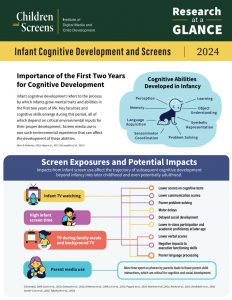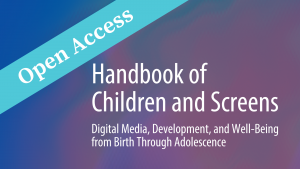 How does screen time affect infant cognitive development? Does early screen exposure affect cognitive development in later childhood and adulthood?
How does screen time affect infant cognitive development? Does early screen exposure affect cognitive development in later childhood and adulthood?
Children and Screens’ latest Research-at-a-Glance on “Infant Cognitive Development and Screens” provides a quick, printable, and accessible resource with current and quality research on screen media’s effects on infant cognitive development.
Adams, E. L., Marini, M. E., Stokes, J., Birch, L. L., Paul, I. M., & Savage, J. S. (2018). INSIGHT responsive parenting intervention reduces infant’s screen time and television exposure. International Journal of Behavioral Nutrition and Physical Activity, 15, 1-9. https://doi.org/10.1186/s12966-018-0657-5.
Barr, R., & Kirkorian, H. (2023). Reexamining models of early learning in the digital age: Applications for learning in the wild. Journal of Applied Research in Memory and Cognition, 12(4), 457–472. https://doi.org/10.1037/mac0000132.
Christakis, D. A. (2009). The effects of infant media usage: What do we know and what should we learn? Acta Pædiatrica, 98, 8-16. https://doi.org/10.1111/j.1651-2227.2008.01027.x.
DeLoache, J. S., Chiong, C., Sherman, K., Islam, N., Vanderborght, M., Troseth, G. L., … & O’Doherty, K. (2010). Do babies learn from baby media? Psychological Science, 21(11), 1570-1574. https://doi.org/10.1177/0956797610384145.
Duch, H., Fisher, E. M., Ensari, I., Font, M., Harrington, A., Taromino, C., … & Rodriguez, C. (2013). Association of screen time use and language development in Hispanic toddlers: A cross-sectional and longitudinal study. Clinical Pediatrics, 52(9), 857-865. https://doi.org/10.1177/0009922813492881.
Durham, K., Wethmar, D., Brandstetter, S., Seelbach-Göbel, B., Apfelbacher, C., Melter, M., … & KUNO Kids Study Group. (2021). Digital media exposure and predictors for screen time in 12-month-old children: A cross-sectional analysis of data from a German birth cohort. Frontiers in Psychiatry, 12. https://doi.org/10.3389/fpsyt.2021.737178.
Gastaud, L. M., Trettim, J. P., Scholl, C. C., Rubin, B. B., Coelho, F. T., Krause, G. B., … & de Avila Quevedo, L. (2023). Screen time: Implications for early childhood cognitive development. Early Human Development, 183. https://doi.org/10.1016/j.earlhumdev.2023.105792.
Hipp, D., Gerhardstein, P., Zimmermann, L., Moser, A., Taylor, G., & Barr, R. (2017). The dimensional divide: Learning from TV and touchscreens during early childhood. In: Barr, R. & Linebarger, D. (Eds.). Media Exposure During Infancy and Early Childhood (pp. 33-54). Springer, Cham. https://doi.org/10.1007/978-3-319-45102-2_3.
Kirkorian, H. L., Pempek, T. A., Murphy, L. A., Schmidt, M. E., & Anderson, D. R. (2009). The impact of background television on parent–child interaction. Child Development, 80, 1350-1359. https://doi.org/10.1111/j.1467-8624.2009.01337.x.
Koch, F. S., Sundqvist, A., Thornberg, U. B., Barr, R., & Heimann, M. (2024). Toddler’s memory and media – Picture book reading and watching video content are associated with memory at 2 years of age. Infancy, 1–21. https://doi.org/10.1111/infa.12609.
Law, E. C., Han, M. X., Lai, Z., Lim, S., Ong, Z. Y., Ng, V., … & Nelson, C. A. (2023). Associations between infant screen use, electroencephalography markers, and cognitive outcomes. JAMA Pediatrics, 177(3), 311-318. https://doi.org/10.1001/jamapediatrics.2022.5674.
Lin, L. Y., Cherng, R. J., Chen, Y. J., Chen, Y. J., & Yang, H. M. (2015). Effects of television exposure on developmental skills among young children. Infant Behavior and Development, 38, 20-26. https://doi.org/10.1016/j.infbeh.2014.12.005.
McHarg, G., Ribner, A. D., Devine, R. T., & Hughes, C. (2020). Screen time and executive function in toddlerhood: A longitudinal study. Frontiers in Psychology, 11. https://doi.org/10.3389/fpsyg.2020.570392.
McLaughlin, K. A., Sheridan, M. A., Humphreys, K. L., Belsky, J., & Ellis, B. J. (2021). The value of dimensional models of early experience: Thinking clearly about concepts and categories. Perspectives on Psychological Science, 16(6), 1463-1472. https://doi.org/10.1177/1745691621992346.
Pagani, L. S., Fitzpatrick, C., Barnett, T. A., & Dubow, E. (2010). Prospective associations between early childhood television exposure and academic, psychosocial, and physical well-being by middle childhood. Archives of Pediatrics & Adolescent Medicine, 164(5), 425-431. https://doi.org/10.1001/archpediatrics.2010.50.
Ramírez, N. F., Hippe, D. S., & Shapiro, N. T. (2021). Exposure to electronic media between 6 and 24 months of age: An exploratory study. Infant Behavior and Development, 63. https://doi.org/10.1016/j.infbeh.2021.101549.
Rideout, V., & Robb, M. B. (2020). The Common Sense Census: Media use by kids age zero to eight, 2020. Common Sense Media. https://www.commonsensemedia.org/sites/default/files/research/report/2020_zero_to_eight_census_final_web.pdf.
Rocha, H. A. L., Correia, L. L., Leite, Á. J. M., Machado, M. M. T., Lindsay, A. C., Rocha, S. G. M. O., … & Sudfeld, C. R. (2021). Screen time and early childhood development in Ceará, Brazil: A population-based study. BMC Public Health, 21. https://doi.org/10.1186/s12889-021-12136-2.
Stockdale, L. A., Porter, C., Coyne, S. M., Essig, L. W., Booth, M., Keenan-Kroff, S., & Schvaneveldt, E. (2020). Infants’ response to a mobile phone modified still-face paradigm: Links to maternal behaviors and beliefs regarding technoference. Infancy, 25(5), 571-592. https://doi.org/10.1111/infa.12342.
Sundqvist, A., Koch, F. S., Thornberg, U. B., Barr, R., & Heimann, M. (2021). Growing up in a digital world – Digital media and the association with the child’s language development at two years of age. Frontiers in Psychology, 12. https://doi.org/10.3389/fpsyg.2021.569920.
Swider-Cios, E., Vermeij, A., & Sitskoorn, M. M. (2023). Young children and screen-based media: The impact on cognitive and socioemotional development and the importance of parental mediation. Cognitive Development, 66. https://doi.org/10.1016/j.cogdev.2023.101319.
Takahashi, I., Obara, T., Ishikuro, M., Murakami, K., Ueno, F., Noda, A., … & Kuriyama, S. (2023). Screen time at age 1 year and communication and problem-solving developmental delay at 2 and 4 years. JAMA Pediatrics, 177(10), 1039-1046. https://doi:10.1001/jamapediatrics.2023.3057.
Zack, E., Barr, R., Gerhardstein, P., Dickerson, K., & Meltzoff, A. N. (2009). Infant imitation from television using novel touch screen technology. British Journal of Developmental Psychology, 27(1), 13-26. https://doi.org/10.1348/026151008X334700.





